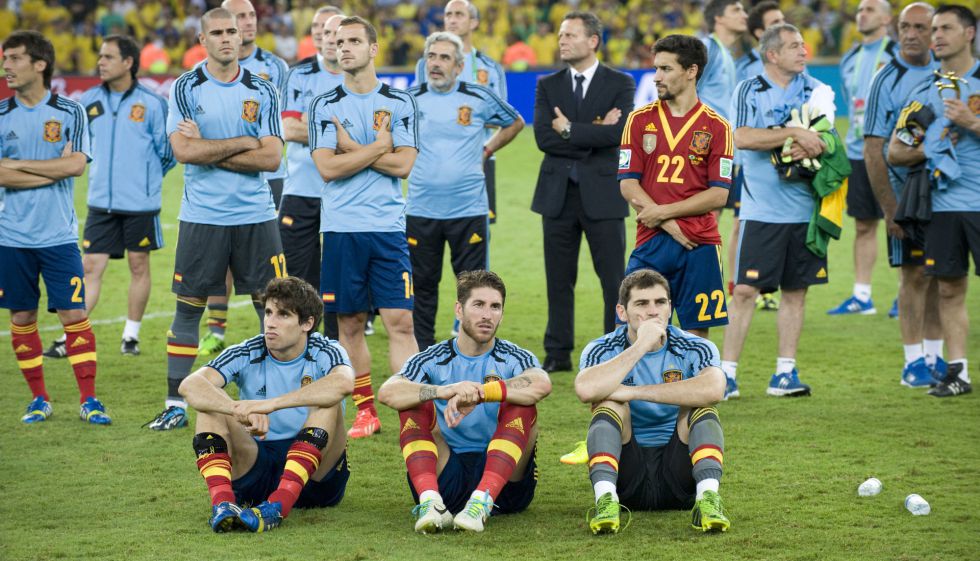Relieved could describe my mood as an understatement, sitting snug at a bar that wasn’t wedged into an airport terminal. In the days prior I had been forced into 23 straight hours of flight life on my return home from work-related adventures, enduring more delays and cancelations than I dare to count. However, after a welcomed day of rest, I was delighted to be perched high on a barstool next to my father to enjoy the Confederations Cup final between hosts, Brazil, and World Cup champions, Spain. Only hours to the wind I had fed on the Italy v Uruguay spectacle where Gigi Buffon was the hero in the Azzuri’s second penalty shootout of the tournament. The prize for his efforts – third place. But now clutching a Guinness in my left fist, it was finally time to luxuriate in a matchup that has avoided the world since 1999, back in an era when Brazil had only four stars over their crest and Spanish world dominance was virtually implausible. The doubleheader of footballing feasts crunched into a Sunday afternoon made me yearn for the European club season, but what appeared next on display whispered a tone of change for the future both domestically and on the grandest of all stages, the World Cup.
Prior to the Confederations Cup commencement, Neymar described the possibility of a Brazil v Spain final as a “dream.” Meanwhile, ESPN commentator, Ian Darke, tweeted “… meeting of old masters and new kings…” Remember that this tournament is the so-called appetizer for the main course next summer. Raise your hand if you’ll need a to-go box!
Before the whistle had even blown or a ball been kicked, fans in every corner of the planet were crammed close to televisions and radios awaiting the final fixture millions had hoped for. The Maracanã Stadium was electric with anticipation fueled by pungent patriotism that has taken to Brazil’s streets in recent weeks in the form of riots and protests against the government’s monetary decisions. Brazil’s stars have done nothing to mitigate the blaze by claiming earlier in the tournament that they are playing for the people of Brazil. The Seleção had a zaftig weight behind its momentum with a trophy at stake.
Furthermore, not only did the crisp grass of Brazil’s Maracanã play stage for two footballing forces but also two estranging philosophies. All young Brazilians are taught not only to win, but to humiliate, to perform, to inspire with their football. It’s a series of expectations almost impossible to live up to given the modern evolution of the beautiful game. And with acts that proceeded from Ronaldo, Rivaldo, Ronaldinho, Romario, Zico, Sócrates, Garrincha, none other than Péle himself, and a flowing list of other household names, emulation is practically unreachable. But they’ll be damned if they don’t try.
Spain on the other hand has revolutionized the way in which we approach football. Beginning in conjunction with Barcelona’s Pep Guardiola era, La Roja have mastered the tranquil art of possession and patience, a practice that numbs their opponent with obsessive interplay until the needle is finally thread in order to deliver the lethal injection. The Brazilian public has made their feelings known about the Spanish style with boos and whistles but at its peak, the philosophy was unflawed. Guardiola won 14 trophies with it at the Nou Camp and Spain have lifted the past two European Championships along with the 2010 World Cup. But with every era of triumph, demise lurks menacingly in the nearby shadows.
It’s natural human behavior to climb to the grand peak of power, the alpha male example if you will. One rules the herd until eventually the leader grows too old to grip the reins or is challenged and defeated by a product of its own domination. For those of you with a puzzled expression at this point, what I mean to say is since Barcelona and/or Spain have established a wrath of terror by means of the football they output, the exterior repressed minds of the game have been busy in their mental labs creating an antidote to counteract the crippling virus. This phenomenon repeats itself over and over, redefining and reinventing the game’s style. It’s the vital chromosome in football’s DNA that allows it to evolve and change as time progresses.
Call it what you may, but football may be on the verge of a breakthrough. I apologize if I keep using Spain and Barcelona synonymously throughout the rest of our journey. The two exhibit reflecting styles of play but without an element of stunned surprise. Throughout the last half-decade, to see a Spanish starting XI without at least five or six Barcelona faces would be a novelty. Therefore, there is a transfer of styles and mentality that has flourished so beautifully in the Catalán capital. When I mention one or the other, keep in mind that I’m referring to the mimicking methodology, embodied by the name tiki-taka, rather than the teams individually. It’s the same methodology that brains all over the globe have been looking to flaw with tactics of their own; the argument goes to say a few have finally succeeded as of late.
Initially at the club level, teams attempted to welcome Barcelona with the ugly ‘park the bus’ tactic by sitting in and weathering the storm from the limited views of their defending third. Those matches bored some and angered others, a scar on the history of football but they were a necessary measure indeed. It was a trial and error that was essential to the next step. The tactic usually didn’t work. One or two shots missed the mark but if you’re going to curl up in a ball to deflect bullet wounds, you’re in trouble. Barcelona was just too good. But what other choice did they have?
Jose Mourinho was brave enough to attempt a new approach in his first Clasico in November 2010 but was a tiger turned kitten when the papers read 5-0 Blaugrana the next day. Perhaps he jumped the gun. However, with every failure came a lesson. The growth from that point has been a long and slow process but the key to the kingdom has been carved more precisely in the last 6 months than ever before. Let’s see how.
Like every puzzle, you need all the pieces to see the full picture. The first piece is blatant athleticism. It sounds so basic, but let's take a look back. Bayern Munich, Real Madrid, and Brazil are all are physical specimens. Mind you, Madrid haven’t lost a Clasico since the Spanish Supercopa first leg last season and have now won 3 out of the last five meetings with their eternal adversaries. In a head to head illustration, they are a fitting model to this case.
In Spain and Barcelona’s case, the crushing force of the opposing team’s constant pressure has unsettled their passing rhythm. Oppositions are learning to collapse on the midfield fulcrum that serves as a creative superhighway for match dictation. But it’s not the only area under siege. With the opponents’ strong and quick wingers keen to break, the Spanish/Barcelona full backs have to be more mindful of their defensive responsibilities, fractioning their input to the attack which limits numbers, which ultimately limits ability to keep possession. And possession is the key element to their approach.
The pace of crafty wide players has certainly kept the Spanish/Barcelona mentality honest - Ronaldo for Real Madrid, Ribery and Robben for Bayern Munich, Neymar and company last night against Spain, and possibly the best and most overlooked example: Italy against Spain in the well-contested semifinal. Italy were by some measure the more threatening side, particularly in the first half because of their wing play. Old fashioned but effective in sense that their wide players, especially Christian Maggio, were straightforward and relentless, creating opportunities from the traditional cross. Jordi Alba busted a lung to get forward at the EURO 2012 final against Italy to score but was doing none of the sort in the Confederations Cup semifinal a year later. He had other things to worry about on his flank.
The Italy semifinal reminded me of the latest Clasicos. Spain (Barcelona in this example) controlled the possession and tempo of the match but when Italy (previously, Real Madrid) managed to get hold of it, bolted up the pitch in a direct fashion with numbers and created the better chances on the break. Italy really should have done better with their opportunities and were unfortunately bitten by the most rotten of all outcomes, the penalty shootout.
Moreover, the outside backs in both Barcelona and Spain’s place need to be cautious for another crucial reason. The centerbacks are rickety in 1v1 situations. They simply need reinforcements. Gerard Piqué chopped down new club teammate Neymar to see red yesterday because the Brazilian did him like a dog’s dinner. A similar instance happened this past season with Piqué giving a penalty away after fouling Ronaldo 1v1 in the Copa del Rey. The more bodies they have between spunky attackers and centerbacks, the better. Not to say Piqué is a bad player by any means. That would be foolish but solitary defending isn’t his strong suit. Sergio Ramos is prone to fouls and bookings as well, though does better in cover than his Catalán counterpart, but who else is there, really? Raúl Albiol? Carles Puyol has struggled with his fitness lately, probably suffering from a career of swashbuckling defending. His international career is dimming.
Another piece to the puzzle is midfield personnel. Brazil brought the fight to Spain’s midfield yesterday, a bunch that looked unarmed. Xavi, Iniesta, and Busquets are fantastic players on the ball but how much grit can they bring to the defensive side of things? Paulinho and Luis Gustavo were animals in the center of the park yesterday. They were everywhere. Each was taxed four fouls a piece but in doing so suffocated the midfield with their tireless presence. That’s an easy price to pay for a trophy, don’t you think? Many teams shy away from high pressure against Spain and/or Barcelona with fear of being brushed aside by a swift combo. So let’s take a look at what we’ve created.
1. The full backs have been neutralized from getting forward with frightening wide players. Their involvement has been halved if not worse.
2. The center midfield has been assaulted by less artistic but more hardworking players limiting the philosophy’s source of power, possession.
The rest takes care of itself, doesn’t it? Mata and Pedro became obsolete apart from the one chance David Luiz cleared off the line from Pedro following a Brazilian lapse in concentration. With no help from the full backs and shackles on the midfield Torres was isolated against Luiz and Thiago Silva. He wasn’t going to win that battle. In fact, he hardly got a whiff of the ball at all.
Del Bosque was forced to substitute Arbeloa for Azpilicueta at the half because, in short, the Madrid fullback was having a stinker. Jesús Navas made an immediate impact by drawing a penalty but Ramos squandered it wide, extinguishing all hope of Spain clawing their way back into it. David Villa replaced Torres at 60 minutes, but I was sure we were going to see Javi Martínez at some point. He was the physical presence the Spanish midfield lacked to bodyguard the playmakers. He won the treble this season with Bayern Munich as a regular starter but can’t find minutes for the national team? Curious indeed, and even more so with the absence of Xabi Alonso. It seems he doesn’t fit the now endangered style of Spain’s play.
It was evident that Spain were hurting for inspiration when set plays seemed like their most promising opportunities with Ramos and Piqué marauding up the park to contest aerially. After Piqué was banished from the pitch, there was only Ramos, and the back cover was already closing on the 2013 Confederations Cup final with just 20 minutes still to play.
Spain and Barcelona have both been criticized for lacking a plan B but in their defense, they’ve hardly needed one in the last five years. But with powers rising around them, the end of an era could be on the horizon for both parties. Stick to your guns or reinvent the wheel? There are choices to be made now, especially for Spain with the World Cup bearing down on us all.
In conclusion, Brazil were winners again 3-0 and well deserved winners at that. It was exactly 11 years since Big Phil Scolari won the World Cup with the Seleção in Korea/Japan. Credit to him for configuring the tactics but the end result wasn’t all of his own doing. It was a much anticipated and impatiently craved solution to the problem that Barcelona and Spain have created. Brazil may reap the benefits, but the solution was collective effort from a variety of coaches that include Heynckes, Mourinho, even Allegri and more. And when I say problem, it’s meant in the highest regard because achieving what Barcelona and Spain have achieved has been inspiring. So inspiring it has provoked a way to defeat them. It opened the common football fan’s eyes and has made him/her ponder what the future has in store. The standard of football has been raised because of what was created in Spain and not every team can accomplish the task to defeat it yet. For Brazil it wasn’t another star over the badge but a feather in their cap for a fantastic tournament.
My dad and I paid the tab, pushed in our stools, thanked the bartender, and wandered back out into the world knowing that it was different. Something had changed.










































